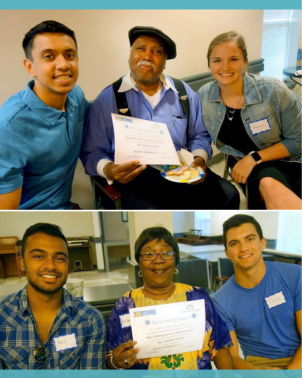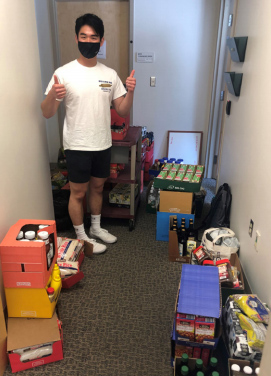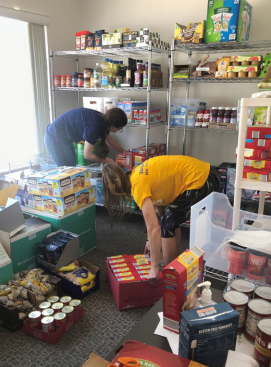Student Engagement in the Age of COVID-19
By Catherine McCorkle
Community engagement enjoys a long history at the College of Medicine. During the COVID-19 pandemic, however, the poignancy and extent of student outreach rose to new levels. From mentoring underserved teens and connecting with isolated seniors to providing food for peers, students are identifying and helping those most in need.

UUH Outreach student participants spending time with their mentors prior to the COVID-19 pandemic.
UUH Outreach Program
Drexel has had a long relationship with Unitarian Universalist House Outreach (UUH Outreach), a nonprofit with deep roots in the Germantown area.
“We all benefit from the strengths that older adults have and the value they bring to the larger community,” says Sara Popkin, MSW, LSW, executive director of UUH Outreach. Their mission is to help older adults maintain their independence and dignity while remaining in their own homes. Indeed, the heart of the program “is visiting and supporting older adults at home,” according to Popkin. That mission was put to the test during the COVID-19 pandemic.
Drexel students work with UUH Outreach through Bridging the Gaps in the summer and the Mentor project during the academic year.
Bridging the Gaps is an eight-week summer program for two Drexel students. According to Roberta Balsam, MS, UUH Outreach’s social services supervisor, “The summer students have been absolutely amazing. They’re an extension of us and our program.” Popkin concurs that the Bridging the Gap students “have done things that truly added value and impact to our program.”
This was no more evident than during the COVID-wracked summer of 2020. Students created and ran eight supportive phone and Zoom groups. Discussing a variety of topics kept isolated seniors connected and engaged when it wasn’t safe to venture out in person. “We’re finding, just like everyone, that loneliness and isolation is a killer,” Balsam says. “It’s having an effect on people, and especially people that already have some isolation issues.” She goes on to describe the student-led phone groups as “amazing.”
In UUH Outreach’s Mentor project, two medical students are matched with a client. In a normal year, they visit the client in their own home twice a month for six months. While the approach changed this year, the goal is the same. According to Balsam, medical students “get an understanding of the challenges and obstacles that aging at home can cause, and so have a greater understanding of the issues when they became physicians. They wouldn’t be seeing ‘the poor, little, gray-haired person’ sitting in front of them. They’d also understand this is a fully formed human being.”
In addition to talking and getting to know one another, students might help a client organize belongings or accompany them on a doctor visit. Balsam says these tasks may not be glamorous, “but they’re things people really need.” Typically, the program culminates with the student presenting a life story project to the client.
First-year medical student Kelsey Whitus participated this year. Although community involvement is a requirement of the College’s Health Advocacy Practicum, Whitus “wanted to help someone personally in the best way I could.” She says her weekly talks with her mentor, where she got to know the older woman and learn her perspectives, “have really been awesome.”
Due to this year’s social restrictions, Whitus says her mentor became a real source of information and knowledge about Philadelphia, particularly since students haven’t met all their classmates yet. “We always talked about Philly — what she’s enjoyed most and how she’s made her life here. She showed me the ropes and made me comfortable when I moved here. Just to have someone to talk to, and talk about my transition to this city, was nice.”
Natalie Correa, another first-year medical student, was likewise drawn to the Mentor project. “I think the work UUH does for older adults is truly important, but there was something necessary about connecting with older individuals, at a time when everybody’s been so socially isolated. I thought about my own grandma and how I haven’t seen her in so long. The idea of being able to give someone an extra level of companionship seemed like a really nice thing to do.”
“When I moved to Philly,” Correa explains, “I was here alone and isolated in my apartment.” She thought the program would be about “making sure an older adult had a social connection,” yet she discovered it was extremely beneficial for her as well. Talking with her mentor “was something I looked forward to,” she says.

Nutrition and Dietetics master's program student Chris Fu.
Queen Lane Food Pantry
As stay-at-home orders, flattening the curve and quarantining became routine, it surfaced in a class of 2024 group chat that some were having difficulty obtaining food. Whether due to affordability or transportation issues, the problem resonated.
Erika Tretner, MD program class of 2024, and other students reached out to connect those in need of transportation with those who could offer rides. While this was an effective short-term solution, Tretner began working with Caitlin Curcio, director of student affairs, to create a food pantry on the Queen Lane Campus.
By spring of 2021, this idea was a reality. The student-run Queen Lane Food Pantry stocks a variety of shelf-stable items. One accesses the pantry with an ID swipe, but the ID log is merely a way to measure student need and the pantry’s usefulness. Student privacy is a priority. The goal, according to Tretner, is to “feed students in need while reducing the stigma around food insecurity.”
During this process, Tretner began talking with Mario’s Market, a food pantry serving the Drexel community on the University City Campus, about organization and fundraising. She’s also collaborated with students in the College of Nursing and Health Professions regarding sharing nutritional information about the items stocked.

Nutrition and Dietetics master's program students Haley Brennan (left) and Marissa Johnson.
“I think this is such a wonderful, collaborative community, and that’s fostered through academics and student activities,” Tretner says. “We’re definitely encouraged to help each other, and it’s been a pleasure to find a need that can be met and to facilitate that.”
Drexel MedMentors
In the late winter and spring of 2020, as students supported one another following the deaths of Ahmaud Arbery, Breonna Taylor and George Floyd, a group also wanted to address what they identified as systemic problems. Their response evolved into the Drexel MedMentors program.
According to second-year medical student Brett Mitchell, the group wanted to “engage with the community, especially the minority population.” Sola Aderonmu, also a second-year medical student, says they created a mentoring program for “disadvantaged students in Philadelphia, to show them [graduate work] is possible.” MedMentors would cultivate “the idea that it’s not impossible to like science or do something in it.” They began working with Elissa Goldberg, MSS, CSW, program director in the Office of Community Engagement, to make this a reality.
At the same time this initiative was progressing, Ashley Opalka, a second-year PhD student in the Neuroscience program, was coming to similar conclusions. She and other graduate students formed Neuroscience Graduate Students for Diversity (NGSD), a group that now welcomes students and faculty across disciplines to increase diversity and foster a safe, welcoming environment. Through their outreach efforts, members of NGSD connected with MedMentors.
The goal of MedMentors is to “spread awareness about opportunities and provide resources,” Opalka explains. “When I was growing up, I didn’t know opportunities were available. I knew I was interested in science, but I thought I had to become a medical doctor. I’m a first-generation college student, so when I got to college, I heard about PhD programs for the first time.”
Once a month, Drexel students present a science-related topic to high schoolers from the Kensington Health Science Academy. The presentation is followed by a panel discussion and Q&A from the students. Different graduate students participate in each session to expose the high schoolers to a diversity of perspectives and journeys to higher education. Because of the pandemic, meetings have been conducted over Zoom.
“At first we thought it would be us talking and them listening, like a seminar,” Aderonmu explains. “But they ask a lot of questions we don’t know the answer to, and we end up all learning together.” Topics have included the path to graduate school, vaccinations, why science changes, and substance abuse disorder. Each session has seen increasing numbers of participants, including teachers and parents, from the high school community.
“It’s important to reach out to those who maybe don’t have all the resources to get into professions that typically are underrepresented by that demographic,” Mitchell states. “From my own experience, I didn’t have that much exposure to somebody in medical school who looks like me. That was an important motivator.”
Opalka shares this motivation, but has another one as well. For two years, she worked in a Drexel lab before entering the PhD program. In that time, she had no real interaction with the medical students. She hopes MedMentors “might promote collaboration within our school, and also teach young students how collaboration is important for the next generation of medicine and science. For us to make people better, we need to understand how things work.”
In the midst of all the work of medical school, Aderonmu says MedMentors “is one of the things that keeps me going. This is the part that reminds me that what I’m doing is a lot bigger than me.”
Being the Change
Whether it’s mentoring high schoolers interested in medical or science careers, serving an older adult population, or meeting peer needs, students in the College of Medicine have risen to the occasion during a particularly challenging year. At a phase of life when it’s considered acceptable, or even good, to bury one’s head in a textbook, these students have looked outward to their community. As Balsam observes, “They can make a huge difference in somebody’s quality of life.” Reflecting on her conversations with high schoolers, Aderonmu says when she was that age, she wished someone could tell her a career in medicine was possible. Today, she says, “I am the mentor I needed at 15 or 16 years old.”
Back to Top